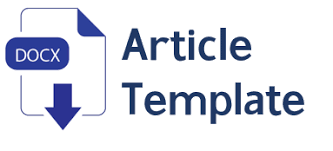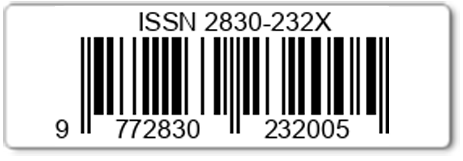Instrumen Hasil Penilaian Afektif Kurikulum 2013
DOI:
https://doi.org/10.59086/jkip.v1i3.80Keywords:
curriculum 2013, affective assessment, assessment instrumentAbstract
Keyword : curricullum 2013, affective assessment, assessment instrument
References
Referensi
Azizah, Ainul, Fakultas Ilmu Pendidikan, Universitas Negeri Surabaya, Fakultas Ilmu Pendidikan, and Universitas Negeri Surabaya. 2017. “Studi Kepustakaan Mengenai Landasan Teori Dan Praktik Konseling Naratif.” Mahasiswa Bimbingan Konseling UNESA 7 2.
Bukit, S. (2022). Penyusunan Rencana Pelaksanaan Pembelajaran PPKn dengan Pendekatan Contextual Teaching Learning di Sekolah Dasar . Tut Wuri Handayani : Jurnal Keguruan Dan Ilmu Pendidikan, 1(2), 1–10
Candra, Intan, Naniek Sulistya, and Tego Prasetyo. 2018. “Pengembangan Instrumen Sikap Sosial Tematik Siswa SD Kelas IV.” Jurnal Ilmiah Sekolah Dasar 2 (4): 455. https://doi.org/10.23887/jisd.v2i4.16167.
Hutapea, Rinto Hasiholan. 2019. “Instrumen Evaluasi Non-Tes Dalam Penilaian Hasil Belajar Ranah Afektif Dan Psikomotorik” 2 (2): 151–65. http:/www.jurnalbia.com/index.php/bia/article/view/94.
Jatmiko, Anggi. 2018. “Pengembangan Instrumen Penilaian Autentik Kurikulum 2013 Aspek Afektif Dalam Mata Pelajaran PAI Kelas VII Di Smpn 3 Kalasan Anggi Jatmiko Universitas Islam Negeri Sunan Kalijaga , Yogyakarta Email : Anggijatmiko@gmail.Com A . Pendahuluan Pendidikan Merupa” 3 (2): 73–92. hhtps://scholar.google.com/scholar?hl=id&as_sdt=0%2C5&q=embangan+instrumen+penilaian+autentik+kurikulum+2013+aspek+afektif+dalam+mata+pelajaran+PAI+kelas+VII+di+smpn+3+kalasan&btnG=#d=gs_qabs&t=1649731972609&u=%23p%3D8s1L26Fu4dEJ.
Magdalena, Ina, Dias Julianti Agustin, and Khairunnisa. 2020. “Jurnal Halaqah.” Hambatan Dalam Penerapan Teknik Evaluasi Non Tes di SDN Pinang 5 Tangerang 2 (2): 3. https://doi.org/10.5281/zenodo.3880822.
Mustafa, Pinton Setya, and Ndaru Kukuh Masgumelar. 2022. “Kajian Review: Pengembangan Instrumen Penilaian Sikap, Pengetahuan, Dan Keterampilan Dalam Pendidikan Jasmani Dan Olahraga Pinton Setya Mustafa 1 , Ndaru Kukuh Masgumelar 2” 8 (1): 31–49.
Ramanda, Riskha, Akbar, Zarina, Kusuma, Wirasti, Murti, R.A. 2019. “Jurnal Edukasi Jurnal Bimbingan Konseling.” Jurnal Edukasi 5 (2): 120–35. https://www.jurnal.ar-raniry.ac.id/index.php/cobaBK/article/view/5019.
Rumtini, Kasimin, and Ari Setiawan. 2022. “Pengembangan Instrumen Penilaian Afektif Kemampuan Bernalar Kritis Peserta Didik Sekolah Menengah Atas” 1 (2).
Setiadi, Hari. 2016. “Pelaksaan Penilaian Pada Kurikulum 2013 The Implementation Of Assessment In The Curriculum 2013.” Jurnal Penelitian Dan Evaluasi Pendidikan 20 (2): 166–78. https://doi.org/10.21831/pep.v20i2.7173.
Setiawan, Ari, Djemari Mardapi, Supriyoko, and Dedek Andrian. 2019. “The Development of Instrument for Assessing Students’ Affective Domain Using Self- and Peer-Assessment Models.” International Journal of Instruction 12 (3): 425–38. https://doi.org/10.29333/iji.2019.12326a.
Swastika, Annisa. 2017. “Pelatihan Penyusunan Instrumen Penilaian Afektif Pada Pembelajaran Matematika Berdasarkan Kurikulum 2013 Untuk Guru-Guru Sekolah Menengah Atas.” Urecol, 87–90.
Ulfa, Itsna Rifiana. 2019. “Implementasi Instrumen Penilaian Sikap Di SDN Gunungsaren Bantul.” Palapa 7 (2): 251–66. https://doi.org/10.36088/palapa.v7i2.357.
Yunita, Luki, Salamah Agung, and Yuni Noviyanti. 2017. “Penerapan Instrumen Penilaian Ranah Afektif Siswa Pada Praktikum Kimia Di Sekolah.” Prosiding Seminar Nasional Pendidikan FKIP UNTIRTA 1 (2): 107–14.
Downloads
Published
How to Cite
Issue
Section
License
Copyright (c) 2022 Tut Wuri Handayani : Jurnal Keguruan dan Ilmu Pendidikan

This work is licensed under a Creative Commons Attribution 4.0 International License.
Tutwurihandayani Jurnal Ilmu Pendidikan
Publisher Lembaga Riset Ilmiah
© 2023

This work is licensed under a Creative Commons Attribution 4.0 International License.


















